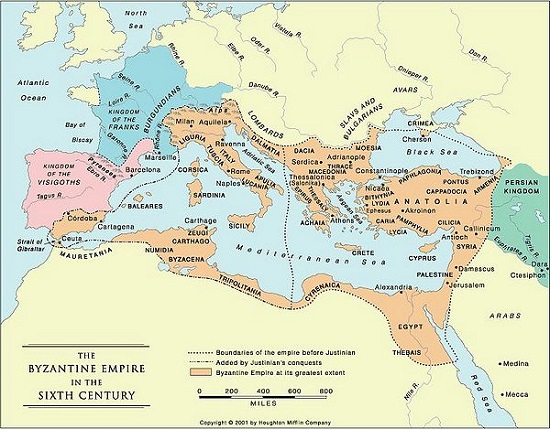The "Secret Sauce" of the Byzantine Empire: Stable Currency, Social Mobility
September 1, 2016
How did Byzantium endure for 1,000 years after the fall of Rome?
One of my reading projects over the past year is to learn more about empires: how they are established, why they endure and why they crumble.
To this end, I've recently read seven books on a wide variety of empires. The literature on empires is vast, so this is only a tiny slice of the available books. Nonetheless I think these 7 titles offer a fairly comprehensive spectrum:
How Rome Fell: Death of a Superpower (Adrian Goldsworthy)
War and Peace and War: The Rise and Fall of Empires (Peter Turchin)
The Rise of Rome: The Making of the World's Greatest Empire (Anthony Everitt)
428 AD: An Ordinary Year at the End of the Roman Empire (Giusto Traina)
Genghis Khan and the Making of the Modern World (Jack Weatherford)
Venice: A New History (Thomas F. Madden)
Byzantium: The Surprising Life of a Medieval Empire (Judith Herrin)
I was not exposed to much history of the Byzantine Empire in high school or college, so I found the last book of particular interest, despite its dry academic style.
The Byzantine Empire, based in Constantinople (now Istanbul), began as the Eastern Roman Empire when the Roman Empire was split into East and West to facilitate defense.
In the original conception, the two halves would be jointly ruled by two emperors. But as the Western Roman Empire frayed and devolved, power shifted to the still-vibrant Eastern Roman Empire, which spoke Greek rather than Latin and was Orthodox Christian rather than Catholic.
The Byzantine (Eastern Roman) Empire endured from the western empire's fall in 476 A.D. to 1453 A.D., when Constantinople fell to invading Turkish forces.
Thus the Byzantine Empire endured for roughly 1,000 years after the Fall of Rome
(977 years, to be exact). It was an Empire that spanned the Medieval ages, that reached
its zenith around 1025 A.D., and lasted right up to the dawn of the Renaissance.

How did Byzantium endure for 1,000 years after the fall of Rome? There are many factors, of course, but I think these four elements are the "secret sauce" of the Eastern Roman Imperial longevity:
1. A stable currency. When the Empire devalued its currency for the first time in the 13th century, it triggered a long-lasting loss of faith in the currency. This devaluation was the beginning of the end, as the Empire never recovered its financial footing.
Lesson: you cannot devalue your way to stability, influence, power or prosperity.
2. Multiple pathways of social mobility via the church, military and civil bureaucracy. Men from poor provincial villages and towns could make their mark and rise to positions of wealth and power via joining the church or military hierarchies, or by serving ably in the Imperial bureaucracy. Women could rise to positions of wealth and influence via marrying well.
3. Pervasive tax collection to fund defense. Empires and states were under essentially constant attack for much of this 1,000 year period of history, and the empire collected land and other taxes via a vast bureaucracy of tax records and collections. Interestingly, it is estimated that the Imperial taxes absorbed about 20% of all income--roughly the same percentage the U.S. government absorbs.
When the tax system fell into disrepair, revenues sagged and defenses almost failed. Competent leadership restored the tax system and defenses, giving the Empire another few hundred years of life.
4. Safe trading routes and markets. The Empire provided protected sea and land routes for traders from everywhere, and Constantinople offered a vast depot for trading and manufacture. Much of the Empire's wealth and tax revenues flowed from trade, and the Empire maintained a long history of offering lucrative trade deals with allies such as Venice.
I see these dynamics as being just as critical in the present age. If a nation's currency loses value, the ladders of social mobility are broken, the tax system is corrupt and/or unfair and trade is restricted or suppressed, the nation/empire is doomed to erosion and collapse.
This essay was drawn from Musings Report 21. The Musings Reports are emailed weekly to
subscribers ($5/month) and major contributors ($50+ annually). If you'd like to support
this blog, please consider subscribing (links below or in the right sidebar).
My new book is #9 on Kindle short reads -> politics and social science:
Why Our Status Quo Failed and Is Beyond Reform ($3.95 Kindle ebook,
$8.95 print edition) For more, please visit the
book's website.
NOTE: Contributions/subscriptions are acknowledged in the order received. Your name and email remain confidential and will not be given to any other individual, company or agency.
|
Thank you, Kevin H. ($5/month), for your stupendously generous subscription to this site-- I am greatly honored by your support and readership. |

Discover why I’m looking to retire in a SE Asia luxury resort for $1,200/month. |